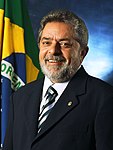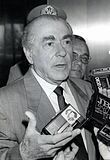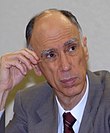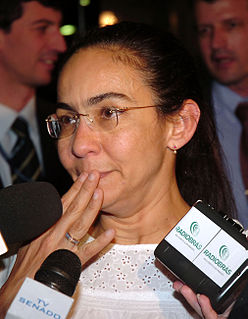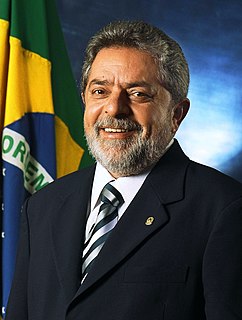| |||||||||||||||||||||||||||||||||
| |||||||||||||||||||||||||||||||||
 Presidential election results map after voting: Blue denotes states won by Cardoso Red denotes states won by Lula Orange denotes the state won by Gomes | |||||||||||||||||||||||||||||||||
| |||||||||||||||||||||||||||||||||
 |
|---|
| This article is part of a series on the politics and government of Brazil |
| Foreign relations |
General elections were held in Brazil on 4 October 1998, with a second round on 25 October. [1] In the first round Fernando Henrique Cardoso was re-elected President and the governorships of 14 states were elected, in addition to all seats in the Chamber of Deputies and Legislative Assemblies, and one third of the seats in the Federal Senate. [2] In the second round the governorships of 12 states and the Federal District were defined. [3] This election was marked by the use of voting machines for the first time ever. They would have been used in all municipalities two years later, in the 2000 local elections.

Brazil, officially the Federative Republic of Brazil, is the largest country in both South America and Latin America. At 8.5 million square kilometers and with over 208 million people, Brazil is the world's fifth-largest country by area and the fifth most populous. Its capital is Brasília, and its most populated city is São Paulo. The federation is composed of the union of the 26 states, the Federal District, and the 5,570 municipalities. It is the largest country to have Portuguese as an official language and the only one in the Americas; it is also one of the most multicultural and ethnically diverse nations, due to over a century of mass immigration from around the world.

Fernando Henrique Cardoso, also known by his initials FHC, is a Brazilian sociologist, professor and politician who served as the 34th President of Brazil from January 1, 1995 to December 31, 2002. He was the first Brazilian president to be reelected for a subsequent term. An accomplished scholar noted for research on slavery and political theory, Cardoso has earned many honors including the Prince of Asturias Award for International Cooperation (2000) and the Kluge Prize from the US Library of Congress (2012).

The Federative Republic of Brazil is a union of 27 federated units : 26 states and one federal district. The states are generally based on historical, conventional borders which have developed over time. The Federal District cannot be divided into municipalities, according to the Brazilian Constitution, the Federal District assumes the same constitutional and legal powers, attributions and obligations of the states and municipalities, instead, it is divided by administrative regions.
Contents
- Historical context
- Presidential election
- Candidates
- Results
- President
- Chamber of Deputies
- Senate
- References
- External links
This was the third general election held after the promulgation of the 1988 Constitution, being also the third time Brazilians voted directly for President since the end of the military dictatorship. Shortly before these elections were held, the federal government was able to approve in the National Congress a constitutional amendment bill allowing the re-election of members of the Executive branch of government. There was much discussion about the constitutionality of the bill, [4] and denouncements were made by the press that some parliamentarians were bribed to vote for the approval of the bill. [5]

The Constitution of the Federative Republic of Brazil is the supreme law of Brazil. It is the foundation and source of the legal authority underlying the existence of Brazil and the federal government of Brazil. It provides the framework for the organization of the Brazilian government and for the relationship of the federal government to the states, to citizens, and to all people within Brazil.
Direct election is a system of choosing political officeholders in which the voters directly cast ballots for the persons, or political party that they desire to see elected. The method by which the winner or winners of a direct election are chosen depends upon the electoral system used. The most commonly used systems are the plurality system and the two-round system for single-winner elections, such as a presidential election, and party-list proportional representation for the election of a legislature.

The National Congress of Brazil is the legislative body of Brazil's federal government. Unlike the state Legislative Assemblies and Municipal Chambers, the Congress is bicameral, composed of the Federal Senate and the Chamber of Deputies. The Congress meets annually in Brasília, from 2 February to 27 July and from 1 August to 22 December.
Controversies aside, then President Fernando Henrique Cardoso, backed by a coalition that included the three major parties of the time – the Liberal Front Party, the Brazilian Democratic Movement Party (which offered their informal support to him), and his own Brazilian Social Democratic Party – was able to be re-elected in the first round after achieving 53% of the valid votes. His margin over Workers' Party candidate Luiz Inácio Lula da Silva was of 21.3%, giving him a second landslide victory; it is to date the last landslide victory in Brazilian history. Lula da Silva received almost 32% of the votes. Ciro Gomes, then a member of the Socialist People's Party came in third, with almost 11% of the votes.
The Democrats is a political party in Brazil. It was founded in 1985 under the name of Liberal Front Party from a dissidence of the defunct PDS, successor to the ARENA, the official party during the military dictatorship of 1964–1985. It changed to its current name in 2007. The original name reflected the party's support of free market policies, rather than the identification with international liberal parties. Instead, the party affiliated itself to the international federations of Christian democratic (CDI) and conservative parties (IDU). The Democrats' identification number is 25 and its colors are green, blue, and white.

The Workers' Party is a democratic socialist political party in Brazil. Launched in 1980, it is one of the largest movements of Latin America. PT governed at the federal level in a coalition government with several other parties from 1 January 2003 to 31 August 2016. After the 2002 parliamentary election, PT became the largest party in the Chamber of Deputies and the largest in the Federal Senate for the first time ever. With the highest approval rating in the history of the country, President Luiz Inácio Lula da Silva is PT's most prominent member. His successor Dilma Rousseff, also a member of PT, took office on 1 January 2011.

Luiz Inácio Lula da Silva, popularly known simply as Lula, is a Brazilian politician, and former union leader who served as the 35th President of Brazil from 1 January 2003 to 31 December 2010. Lula was a founding member of the Workers' Party (PT) and ran unsuccessfully for President three times before achieving victory in the 2002 election, being re-elected in the 2006 election.

